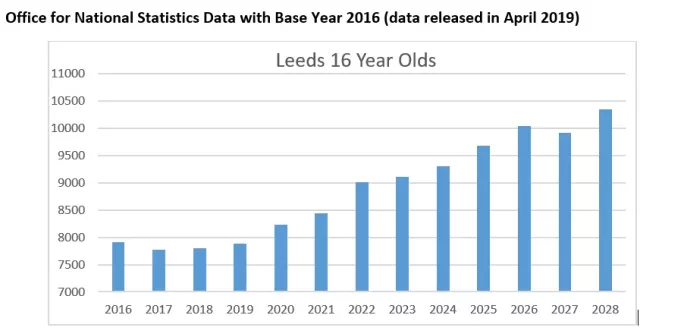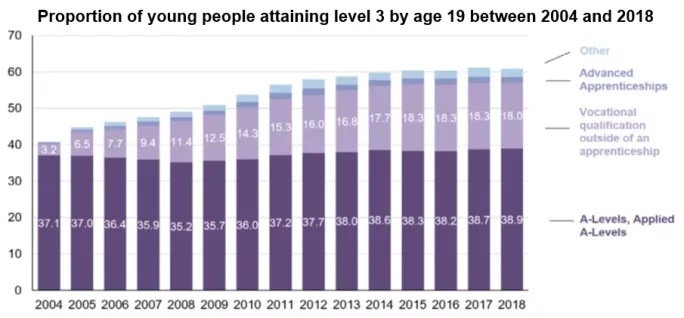- Home
- ‘Our college is full - we need funding to grow’
‘Our college is full - we need funding to grow’

As I am writing, colleges await positive news on funding in the Budget – scheduled for 11 March – and seek stability in the long-awaited ministerial restructure. The Department for Education itself acknowledges in a report published last week that the FE sector faces existential funding pressures. If the situation is not addressed, it warns entire departments and even colleges may disappear.
While the recent (and hugely welcome) increase in the base rate for 16-18 study programmes eases the pressure a little, what is really needed in many parts of the country is a large injection of capital funding for new vocational college buildings. This is particularly the case in Leeds, where demographic growth threatens a perfect storm that could result in young people being left with no "September Guarantee" in years to come.

The number of 16 year-olds in cities like Leeds is rising rapidly and by 2026, there will be an additional 5,500 16- to 18-year-olds in the city. Despite its size as one of the largest FE colleges in the country, Leeds City College is full. We are working hard to make small changes to increase capacity for September 2020.
News: £400m boost for colleges: 16-18 funding finally raised
More: Conservatives announce £1.8bn for college buildings
College buildings: Are these the most beautiful colleges in the UK?
College funding
Beyond this September, we will need capital support from central government to cope with demand. As well as the increase in population, we are anticipating a further local and national shift in student numbers away from A-level programmes and into vocational courses.
In Leeds, the majority of 16- to 18-year-olds study in a large number of small school sixth forms. Maintaining and running small school sixth forms is becoming harder whilst providing good student choice from a broad range of A-level subjects with small student numbers is impossible. As the reality of a more difficult linear A-level pathway begins to bite, the numbers studying a three- or four-subject A-level route are declining. Many sixth forms now offer one or two A levels alongside applied general qualifications. Sometimes this works – but sometimes it isn’t the best option for young people, leading to less clear progression routes to higher-level study.
The national proportion of 16-year-olds starting pure A-level programmes declined by 17 per cent between 2016 and 2018, whilst the proportion studying full-time vocational courses at level 2 and level 3 has increased. I am anticipating a further decline in the proportion of young people studying A levels when the data for 2018-19 is published.

In order to increase the number of young people attaining higher-level skills at levels 4, 5 and 6, we first need to increase numbers reaching level 3. While we rightly worry about the quality and consistency of careers advice available to 11- to 16-year-olds, it is easy to forget that all of the increase in young people attaining level 3 qualifications over the past 15 years has come from vocational courses.
Population growth
All the available data I can find suggests that the majority of the future growth in places driven by population growth of 16- to 18-year-olds will need to be in technical and vocational education at level 2 and level 3. More A-level growth (whether through free schools or expanding school sixth forms) will not meet the needs of these young people or the skills requirements of the regional and national economy, where technical skills at levels 4 and 5, in particular, are in huge demand.
We may be tempted to think that increasing demand for places in post-16 education driven by demographic growth can be met by growing numbers in school sixth forms. However, this risks duplication of existing provision and increasing competition for a declining number of A level students without addressing the need for more places on technical and professional courses. Far better to invest in the sector best placed to deliver the employer-focused, high-quality technical education needed at levels 2 to 5: further education.
A few months ago in November, Boris Johnson promised a £1.8 billion investment in colleges and that the “rebuild” would be part of a “skills revolution”. I am writing this in my office in a 1960s' college building in Leeds that is rather cold today. I certainly agree that our students and staff deserve more up-to-date facilities and equipment. We also urgently need capital investment now to create more space so that we can meet the increasing demand driven by population growth and an increasing proportion of students choosing vocational study in FE colleges.
Colin Booth is chief executive of the Luminate Education Group, formerly Leeds City College Group
Keep reading for just £1 per month
You've reached your limit of free articles this month. Subscribe for £1 per month for three months and get:
- Unlimited access to all Tes magazine content
- Exclusive subscriber-only stories
- Award-winning email newsletters